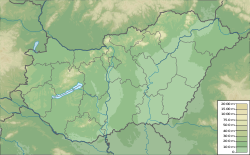1763 Komárom earthquake
| Local date | June 28, 1763 |
|---|---|
| Local time | 05:28 UTC[1] |
| Magnitude | 6.2[2] to 6.5[3] Mw |
| Depth | 15.0 km |
| Epicenter | 47°44′N 18°09′E / 47.73°N 18.15°E[1] |
| Areas affected | Kingdom of Hungary |
| Casualties | 83[1] |
The 1763 Komárom earthquake occurred in or near the town of Komárom in Komárom County in the Kingdom of Hungary on 28 June between 5 and 6 in the morning.[2] The earthquake has been estimated at 6.2[1] to 6.5[2] on the moment magnitude scale.
Background
[edit]The Komárom earthquake was an intraplate earthquake in the Pannonian Basin associated with the Rába-Hurbanovo tectonic line. Earthquakes in the region are caused by deformation resulting from the movement of the Adriatic plate relative to the Eurasian plate. The 1763 earthquake accounts for about 80% of all the seismic moment released in the Komárom area since 1599.[3] Due to the lack of seismologic instruments in 1763, the mechanism of and depth of the earthquake is not known, though most earthquakes in the region occur in the upper 20 km of crust.
Casualties and damage
[edit]
The earthquake killed 83 people[1] and 102 people were wounded.[4] Damage in Komárom was extensive – contemporary reports note that the newly constructed Jesuit church and college were heavily damaged, including the collapse of two towers which killed several people.[5] According to reports, 102 people were wounded and 7 churches, 279 dwelling fully and 353 partially collapsed.[4] Other reports indicate that soil liquefaction occurred due to the earthquake.[6]
See also
[edit]References
[edit]- ^ a b c d e National Geophysical Data Center (1972). "National Geophysical Data Center / World Data Service (NGDC/WDS): Significant Earthquake Database". NOAA National Centers for Environmental Information. doi:10.7289/V5TD9V7K. Retrieved 2022-04-15.
- ^ a b c Varga, Péter; Szeidovitz, Gy.; Gutdeutsch, Rudolf (March 2001). "Isoseismal map and tectonical position of the Komárom earthquake of 1763". Acta Geodaetica et Geophysica Hungarica. 36 (1): 97–108. doi:10.1556/AGeod.36.2001.1.8. S2CID 140629684. Retrieved 2016-01-06.
- ^ a b Varga, Péter; Bus, Zoltan; Kiszely, Márta. "Strain Rates, Seismic Activity And Its Temporal Variations Within The Pannonian Basin". Geodetic and Geophysical Research Institute, Seismological Observatory. Retrieved 2016-01-06.
- ^ a b "Overview – Hungary". Twisterrob. Retrieved 2016-01-06.
- ^ Eisinger, Ute; Gutdeutsch, Rudolf; Hammerl, Christa (August 1992). "Historical Earthquakes in Central Europe" (PDF). Abhandlungen der Geologischen Bundesanstalt. 48. Wien: 33–50. ISBN 3-900312-83-4. ISSN 0378-0864.
- ^ Toth, László; Mónus, P.; Zsíros, T.; Kiszely, Márta (2002). "Seismicity in the Pannonian Region – earthquake data" (PDF). EGU Stephan Mueller Special Publication Series. 3. European Geosciences Union: 9–28. Bibcode:2002SMSPS...3....9T. doi:10.5194/smsps-3-9-2002. Retrieved 2016-01-06.

